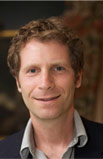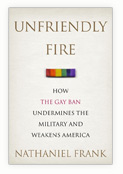|
THAT’S
NOT AMERICA
by
Nathaniel
Frank, Ph.D.
Senior
Research Fellow, Palm
Center
University
of California, Santa Barbara
|
 |
I was not the only one of my friends who fought
back tears last fall when I watched Colin Powell
describe why he was endorsing Barack Obama for
president. Here was a man who was born in
Harlem to Jamaican immigrants, grew up in the
Bronx, and knew a thing or two about both racism
in America and the power of the American dream to
transcend it. A direct beneficiary of the
post World-War-II racial integration of the
military, Powell became the first black Chairman
of the Joint Chiefs of Staff, the highest-ranking
officer in the country. Once considered one
of the most admired men in America for his
military leadership during the first Gulf War,
many thought he might become the first African
American occupant of the White House.
He is also a
Republican. But he crossed party lines to
back Obama and spoke for ten eloquent minutes
without notes on NBC’s “Meet the Press” to
explain why: He spoke of Obama and his generation
as “transformational,” “aspirational” and
“inclusive,” and of McCain’s campaign as
becoming “narrower and narrower.” He said
Obama is crossing ethnic, racial and generational
lines to bring people together. And in
response to charges that Obama is a Muslim, Powel
spoke out movingly not only against this false
charge, but against the implication that somehow
being Muslim was the worst thing in the world:
“The really right answer is, what if he is? Is
there something wrong with being a Muslim in this
country? The answer's no, that's not America.”
In that statement, delivered with a no-nonsense
force and passion that has made the General
famous, Powell didn’t only defend Obama, he
defended all of America, and what it stands for.
It was refreshing
to see such strong leadership displayed even in
the few minutes of Powell’s interview. But
despite his reputation as a great leader, Powell
has not always led. In 2003, he made a
flawed case for the U.S. invasion of Iraq.
Since then, the nation has learned that he had
grave misgivings about going along with the
invasion, yet he let himself serve as a chief
spokesman for the Bush White House in making that
case. Speaking of the disastrous war in
Iraq, former Secretary of State James Baker has
said that Powell was “the one guy who could have
perhaps prevented this from happening.”
As I began
researching my new book, Unfriendly
Fire: How the Gay Ban Undermines the Military and
Weakens America, I looked into
Powell’s past to understand what I could about
his personality, about what drove him and what
shaped his approach to leadership. As with
the case for the Iraq War, Powell has been
criticized for playing the lead role in sustaining
a ban on gay and lesbian troops. While
advocates of equal rights compared the gay ban to
racial segregation in the military, Powell
forcefully rejected the analogy, and his stature
as a top African American general put the issue to
rest. Rear Admiral John Hutson, a
high-ranking official who was part of the talks
over whether to lift the gay ban, recalls in my
book that “Powell put a hole in the analogy to
racial integration, not particularly logically,
but just by force of his personality and who he
was.” Hutson said it allowed the rest of
the military leadership to “hide” behind
Powell. It allowed other champions of
anti-gay discrimination to say, “this isn’t
the same as racial integration. This is
different, and General Powell says so.”
Powell was probably the one guy who could have
prevented “don’t ask, don’t tell” from
becoming law.
It is true that the
issue of race and the issue of sexuality are very
different in detail. What is eerily similar,
though, is the string of arguments that were used
against both blacks and gays equal treatment in
the military. In the 1940s, America was told that
whites would not respect or obey commands by an
African American; that integration would prompt
violence against a despised minority and would
lower public acceptance of the military; that the
military should not be used for “social
experimentation”; that military integration was
being used to further a larger minority rights
agenda, which would ultimately break the armed
forces; that God’s plan was to keep whites above
blacks; that blacks had a higher incidence of
disease; and that forcing whites to share intimate
quarters with blacks was an unacceptable invasion
of white privacy. Every last one of these
arguments was used to oppose gay service in the
1990s. As Congressman Barney Frank put it,
“Saying we can’t have gay people in the
military because heterosexuals won’t like them
is like saying we can’t have black people around
because white people won’t like them. That
was wrong, and this is wrong.”
When I was
conducting my research, I set out to assess
honestly whether the chief players in creating
“don’t ask, don’t tell” were motivated by
genuine concern for the needs of the military or
by hostility to gays and lesbians. While
Powell went out of his way to avoid insulting gay
people, and indeed spoke of them as “proud,
brave, loyal, good Americans,” it is essential
to compare his moral leadership on race with his
role in setting back the cause of equality for
gays and lesbians.
Powell had written
early in his career that the military “affords
the opportunity for advancement that regrettably
is not in every part of our society,” but that
he hoped would “spread to all parts of our
society so that only achievement and performance
will be the basis for advancement.” He described
his generation as one “where almost all barriers
have now been dropped.” It is fair to
assume that his experience as an African American
made him a bit more mindful of the victimization
of Muslim Americans. The experience of being
black and being Muslim in America are quite
different, but as someone who has suffered from
racial discrimination, Powell was able to notice
and oppose an ugly episode of discrimination
against other victims beyond his own group.
Not so gay
Americans. By repeating ad nauseam that the
service of open gays would harm “order and
discipline,” and would be “difficult to
accommodate,” Powell legitimized prejudice in
the ranks. Unlike his moving comments about
Muslim Americans, Powell said it was not for him
to “make a moral judgment” about whether being
gay was “a correct lifestyle or not.” If
he had made the comment as a precursor to
defending diversity and equal rights in America,
that would have been one thing; but instead he
made the remarks to rationalize his own failure to
support equal treatment. It was what Admiral
Hutson called a “moral passing of the buck.”
Now imagine what
true moral leadership might have looked like from
Powell on gay Americans. To the question, is
someone in the military gay, and is that okay?
Powell might have answered this way: “The really
right answer is, what if he is? Is there something
wrong with being gay in this country? The answer's
no, that's not America.” In that
statement, which Powell has yet to make, he would
have defended not just gay Americans, but all of
America, and what it stands for.
| Nathaniel
Frank is the author of Unfriendly
Fire, the definitive story of
“don’t ask, don’t tell” written by
the nation’s most widely-recognized expert
on the policy.
Drawing
on decades of research on gay service and
hundreds of exclusive interviews with
policymakers, government officials,
academics and service members, the book
shows the cruel and unaffordable costs of
the current gay ban. |

|
©
2009 Gay Military Signal
|